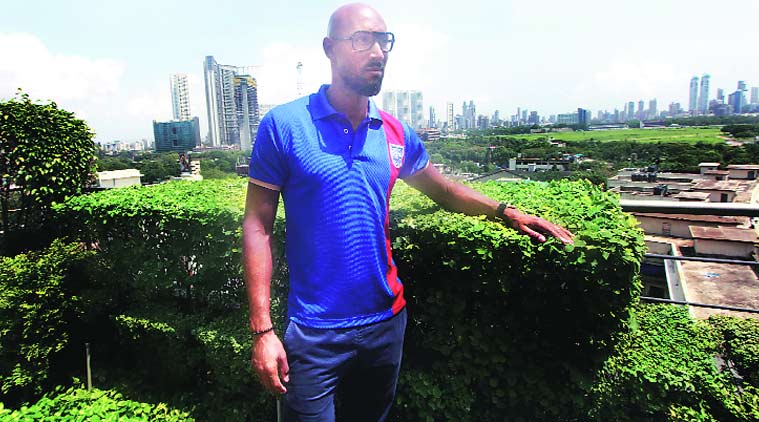The boot is on the other foot
 As player-cum-manager of Mumbai City FC, the 36-year-old says he hopes to imbibe the man-management skills of Carlo Ancelotti and the tactical nous of Antonio Conte. (Source: Express photo by Kevin D’Souza)
As player-cum-manager of Mumbai City FC, the 36-year-old says he hopes to imbibe the man-management skills of Carlo Ancelotti and the tactical nous of Antonio Conte. (Source: Express photo by Kevin D’Souza)
Nicolas Anelka is trying to explain what his philosophy as a manager would be. For a moment he pauses, perhaps struck by the contradictions himself. He grins shyly, looking down. He is visibly uncomfortable in a room full of journalists. He is not used to talking much. But Anelka disguises it well.
Dressed casually, he speaks confidently about his new role as the player-manager of Mumbai City. But the irony cannot escape. In his long, mercenary-esque career, Anelka has hardly been a manager’s player.
Anelka the player is an enigma that even the best brains in football have not been able to comprehend. His CV looks great — a Champions League win with Real Madrid, Premier League and FA Cup doubles with both Arsenal and Chelsea, a European Championship title with France put his achievements as a player beyond question.
For all those stars on shirts though, his troubled relationship with his coaches have overshadowed everything. He fell out with Vicente del Bosque at Real Madrid, had a clash of personalities with then Liverpool coach Gerard Houllier, hit out at Andre Villas-Boas at Chelsea and twice, he was rather (in)famously involved in bust-ups with France coaches Jacques Santini (2002) and Raymond Domenech (2010).
Now finding himself managing the dugout, his perspective has changed. He has done this before, at Shanghai Shenua in the Chinese League. He was their player-manager for four months. Hardly any time to make an impact but enough to realise the challenges of the job. “As a player, you just concentrate on your game. I did it before. But as a manager, you have a lot of work. You have to look at players, videos and so many other things. It’s hard work.”
Anelka, however, prefers to look up to the two men who have impacted his footballing sense the most.
The Frenchman says he hopes to have the man-management skills of Carlo Ancelotti and the tactical brains of Antonio Conte. “Conte was a typical Italian, had great knowledge about the game. Every day for 45 minutes he used to talk tactics,” Anelka says. “Ancelotti speaks a lot with players. A player’s understanding with his manager is very important. If the manager makes you feel good then you can perform on the pitch. So I too will speak a lot to my players and make them feel comfortable.”
But here’s the thing. Anelka does not speak much. Getting him to express anything is nearly impossible. His former teammates have often expressed astonishment at how he was almost mute in the dressing room. But today, he spoke for 36 minutes and 32 seconds to be precise. It’s a lot by even Anelka’s supremely silent standards.
Last season, he did not speak a word (contractually bound, some say, as interviews and press conferences were not a part of the finer details). In the dressing room, he was among the quietest. Quieter even than the shier Indian players.
He has assured he will do a lot more talking this season. And get the Indians to talk as well. “I will do what is minimum required,” he laughs. “It’s new for me (to speak) but this role demands it. I have been working with a lot of managers and I know how to speak with players. I know how to make them feel confident and get the best out of them. I know I have to speak with the players so everything will be fine.”
Anelka will coach a team that is high on talent. India’s highest goal-scorer Sunil Chhetri will lead the attack. Haitian Sony Norde, instrumental in Mohun Bagan’s I-League triumph, will support him from the wings while Brazilian Andre Moritz will be the key playmaker. “Attack wise, we are strong. So I will step in to play only when required,” he says.
“And if I don’t score for four matches, you can bench me,” he jokes, looking towards his team management.
As a coach, Anelka is willing to move out of his comfort zone to ensure his players are comfortable on field. But he has no plans of turning into a full-time manager.
“No no,” he smiles, when asked about his managerial ambitions. “I am just doing it this season. I have no plans to be a manager. It’s a lot of work. I did it in China. You start your day at 8 in the morning and finish at 5. You never say never. But my play is to be a player first.”





